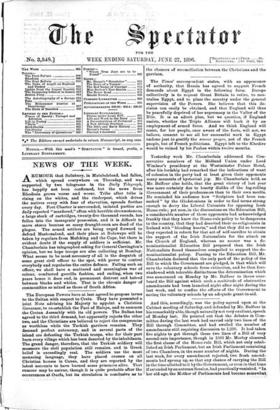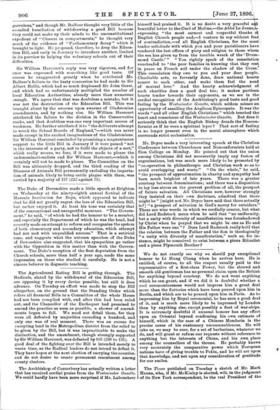And this, accordingly, was the policy agreed upon at the
Cabinet meeting of Saturday, and defended by Mr. Balfour in his remarkably able, though naturally not very exultant, speech of Monday last. He pointed out that the debates in Com- mittee during the last week had carried only two lines of the Bill through Committee, and had swelled the number of amendments still requiring discussion to 1,238. It had taken five nights to get through these two lines of a Bill of very second-rate importance, though in 1893 Mr. Morley closnred the first clause of the Home-rale Bill, which not only estab- lished an Irish Parliament, but an Irish Parliament consisting of two Chambers, in the same number of nights. Daring the last week, for every amendment rejected, two fresh amend- ments had sprung up, so that any chance of carrying the Bill in the time allotted to it by the Government, or even in that time if extended by an autumn Session, had practically vanished. "In her old age, the Mother of Parliaments had become somewhat
garrulous," and though Mr. Balfour thought very little of the so-called humiliation of withdrawing a good Bill because they could not make up their minds to the unconstitutional expedient of " Closure in compartments," he thought very much of the evidence of " Parliamentary decay " which it brought to light. He proposed, therefore, to drop the Educa- tion Bill, and early in January to introduce another, limited in its purview to helping the voluntary schools out of their difficulties.

















































 Previous page
Previous page